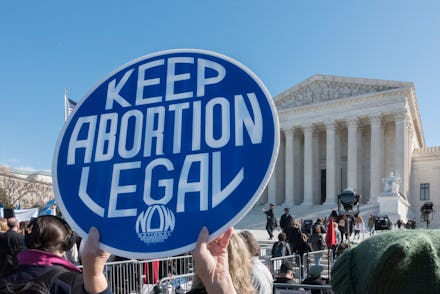This Republican bill in Utah would make abortions a felony worth up to 15 years in prison

The Supreme Court is hearing a case in June Medical Services v. Russo that could change abortion laws across the country. Conservative politicians are already plotting new one for if that moment comes. In Utah, lawmakers are considering a bill that would make abortion a felony and send anyone who tries to administer one to prison for it.
Called SB174, the bill could only go into effect if the Supreme Court overturns Roe v. Wade, which protects the constitutional right to an abortion nationwide. Unfortunately, that could happen in the near future, as the Supreme Court is considering a Louisiana case with the potential to overturn precedent.
If passed, the bill would make almost every abortion illegal in Utah. There are only a couple exceptions, like medical emergencies or in cases of rape or incest. Under the bill, someone who tries to administer an abortion — whether that person is a doctor or the pregnant person themselves — can be charged with a second-degree felony. That charge comes means they can get 15 years in prison and a fine of up to $10,000.
The bill went through the state's Senate back in February and passed the state House on Monday. During the committee meeting, the bill's sponsor, state Sen. Daniel McCay (R), was pressed about how the bill would go after anyone who self-administered their own abortion.
“Women die in pregnancy from unsafe abortions in countries that have this policy,” state Rep. Ray Ward (R), a doctor, said. “I worry that if we were to have this be our policy, that we would see a rise in maternal deaths from unsafe abortion.”
McCay's defense centered around the "advanced social services" that the United States has to offer. When pressed by Ward on what social services would make an infection from an unsafe abortion no longer potentially life-threatening, McCay said it depends on the woman's income level and proximity to medical care — in other words, that access would not be the same for lower-income or rural populations.
“I’m trying to balance the life that’s been lost in utero and at the same time I’m trying to balance those two concerns," McCay said, according to Vice.
There are no exact statistics on how many people self-manage abortions in the United States. But a 2019 report from the Guttmacher Institute did find that 18% of non-hospital facilities saw at least one patient who tried to end a pregnancy on their own. This marked an increase from 12% in 2014.
If abortion is made illegal, there are obvious concerns about that number climbing. Bills like Utah's SB174 do not protect people from dangerous at-home methods, though. Instead, these bills take away the option to access safe abortions and appropriate medical care should anything happen.
While this bill would be unconstitutional if the Supreme Court doesn't overturn Roe v. Wade, that may not be enough to protect people's access to abortions. In Texas, seven towns passed ordinances banning abortions, despite being in blatant violation of federal law.